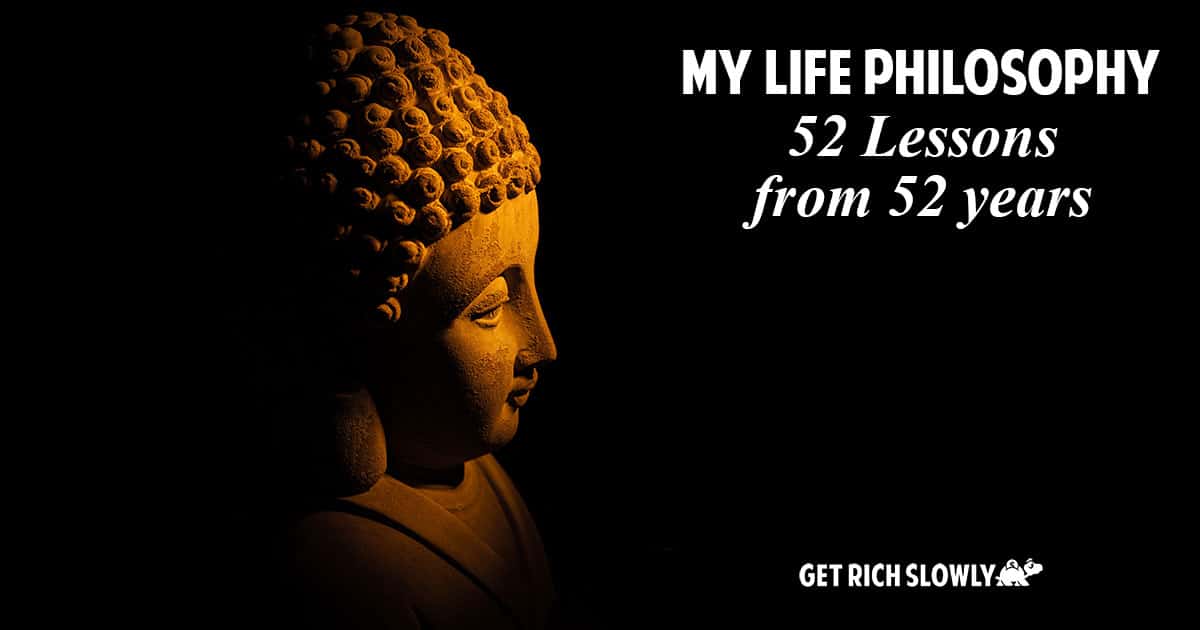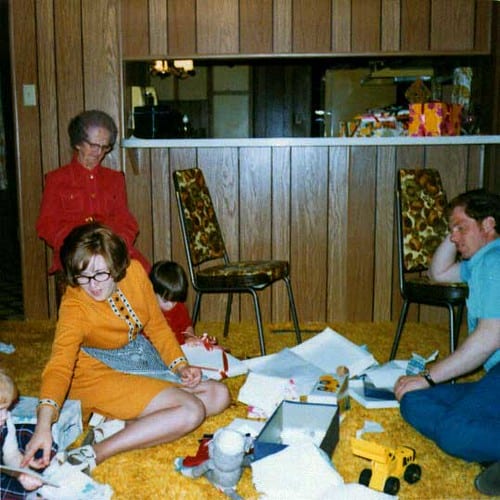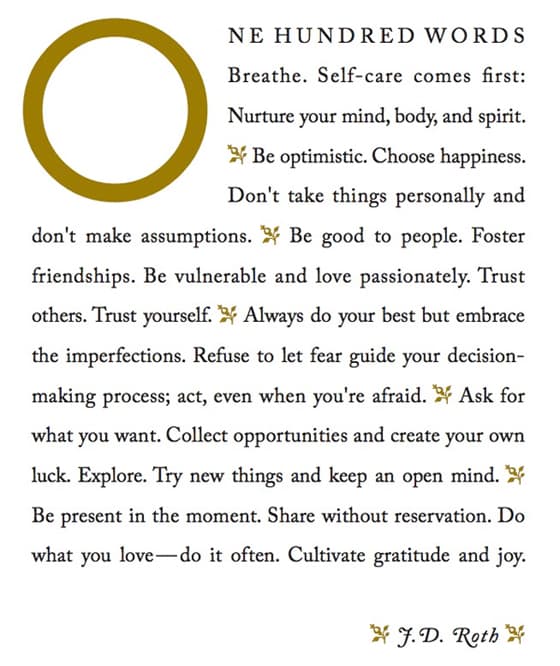My personal philosophy of life: 52 lessons from 52 years

On this day in 1969, baby J.D. entered the world. I don’t think there’s any way my parents could have predicted the path their firstborn would take through life. It hasn’t always been easy — no thanks to the obstacles I’ve placed in my own way — but I’ve really had a wonderful (and interesting) life, and I look forward to whatever time is left me.
I’m going to commemorate my 52nd birthday by sharing 52 of the most important things I’ve learned during my time on Earth. These are the most important pieces of my life philosophy.
My Life Philosophy
Before we dive into the rest of my life philosophy, I want to make something clear: I am no wiser or smarter than anybody else. And I’m certainly no better. But I am an individual.
I’m my own person with my own personal preferences and personal experiences. These have all jumbled together over the past 52 years to give me a unique perspective on life (just as you have a unique perspective on life). To quote my favorite poem:
Much have I seen and known; cities of men
And manners, climates, councils, governments,
Myself not least, but honour’d of them all;
And drunk delight of battle with my peers,
Far on the ringing plains of windy Troy.
I am a part of all that I have met…

Some of these ideas are original to me. Some aren’t. When I’ve borrowed something, I’ve done my best to cite my source. (And I’ve tried to cite the oldest source I can find. Lots of folks borrow ideas from each other. There’s nothing new under the sun and all that.)
Here are 52 principles I’ve found to be true during my 52 years on this planet. I’ll lead with this year’s new addition.
1. Know thyself
All of us are similar, but each of us is different. It’s these differences that make us unique individuals. It’s up to you to discover your strengths (and weaknesses), to figure out what’s important to you, to plot your own course through this world. Taking time periodically to re-assess what makes you tick is an essential part of building a life that allows you to flourish.
2. Love yourself
All my life, I’ve struggled with low self-esteem. There have been times when I’ve hated myself. Recent years have been especially tough for me as anxiety and depression proved to be crippling for months on end. Working with a therapist helped. She helped me to understand that it’s important to learn to both accept myself and love myself — even though, like everyone, I’m imperfect. I still have a long way to go, but I’m making progress.
3. Self-care comes first
If you’re not healthy, it’s tough to be happy. Before you can take care of your friends and your family, you need to take care of yourself. Eat well. Exercise. Nurture your mind, body, and spirit. Your body is a temple; treat it like one. If you don’t have your health, you’ve got nothing.
4. You get what you give
Your outer life is a reflection of your inner life. If you think the world is a shitty place, the world is going to be a shitty place. If you think people are out to get you, people will be out to get you. But if you believe people are basically good, you’ll find that this is true wherever you go.
5. Life is like a lottery
You receive tickets every time you try new things and meet new people. Most of these lottery tickets won’t have a payout, and that’s okay. But every now and then, you’ll hit the jackpot. The more you play — the more you say “yes” to new friends and new experiences — the more often you’ll win. You can’t win if you don’t play. That said, however…
6. Luck is no accident
What we think of as luck has almost nothing to do with randomness and almost everything to do with attitude. Lucky people watch for — and take advantage of — opportunities. They listen to their hunches. They know how to “fail forward”, making good out of bad. [Via the book Luck is No Accident.]
7. Don’t try to change others
“Attempts to change others are rarely successful, and even then are probably not completely satisfying,” Harry Browne wrote in How I Found Freedom in an Unfree World. “To accept others as they are doesn’t mean you have to give into them or put up with them. You are sovereign. You own your own world. You can choose…There are millions of people out there in the world; you have a lot more to choose from than just what you see in front of you now.”
8. Don’t allow others to try to change you
Again from How I Found Freedom in an Unfree World: “You are free to live your life as you want…The demands and wishes of others don’t control your life. You do. You make the decisions…There are thousands of people who wouldn’t demand that you bend yourself out of shape to please them. There are people who will want you to be yourself, people who see things as you do, people who want the same things you want. Why should you have to waste your life in a futile effort to please those with whom you aren’t compatible?”

9. Be impeccable with your word
Be honest — with yourself and others. If you promise to do something, do it. When somebody asks you a question, tell the truth. Practice what you preach. Avoid gossip. [This is directly from Don Miguel’s The Four Agreements.]
10. Don’t take things personally
When people criticize you and your actions, it’s not about you — it’s about them. They can’t know what it’s like to be you and live your life. When you take things personally, you’re allowing others to control your life and your happiness. Heed the Arab proverb: The dogs bark but the caravan moves on. [This is also one of The Four Agreements.]
11. Don’t make assumptions
The flip side of not taking things personally is to not assume you know what’s going on in other people’s heads. Don’t assume you know the motivations for their actions. Just as their reality doesn’t reflect your reality, your life is not theirs. Give people the benefit of the doubt. [Another of The Four Agreements.]
12. Always do your best
Your best varies from moment to moment. Some days in the gym, for instance, I’m able to lift heavier weights than on other days. Some days I can run faster than usual; some days, I’m slower. That’s okay. What matters most is that I give my best effort every time. No matter what you do, do it as well as you can. This is one of the keys to success and happiness. [This is the last of The Four Agreements.]
13. Effort matters more than skill or talent
“Effort counts twice,” argues Angela Duckworth in Grit: The Power of Passon and Perseverance. Skill, she says, is talent multiplied by effort. The more you do what you’re good at, the better you get. But achievement is the product of skill multiplied by effort. Effort counts twice. (This may be why psychologists say it’s better to praise your child’s efforts instead of her results. Praise her for spending time on her homework, not because she got an A.)
14. Embrace the imperfections
If you do what is right, and you do your best, then there’s no reason to feel bad about the outcome. Nobody’s perfect. Don’t beat yourself up if you make mistakes. And don’t sweat it if other people get upset with you too. If you’re doing the best you can, that’s good enough.
15. The perfect is the enemy of the good
Too many people never get started because they don’t know what the “best” first step is. You don’t know the best guitar, so you never learn to play. You don’t know which Spanish book is best, so you never learn to speak. You don’t know how to bench press, so you never go to the gym. The perfect is the enemy of the good. Don’t worry about getting things exactly right — just choose a good option and do something to get started.
16. There’s no single “right” way to achieve success
Each of us is different. We have different goals, personalities, and experiences. We each need to find the tools and techniques that are effective for our own situations. There’s no one right way to eat, love, pray, or pay off debt. Don’t believe anyone who tells you there is. Experiment until you find methods that are effective for you. (Note, however, that there are wrong ways to do these things — steer clear of obvious bad choices.)
17. Be present in the moment
Accept life for what it is, without labels or judgment. Yield to events; don’t block them. Go with the flow. Nothing exists outside the present moment: Don’t dwell on the past or worry about the future. Improve the quality of the here and now. When you do something, do that thing. When you’re with somebody, be with them. Don’t multitask. Put away the smartphone or the computer or the book. Be all there. [This is an ancient concept made popular by The Power of Now.]
18. Spirituality is personal
The desire for one person (or group) to impose her (or their) beliefs on others is the source of much of this world’s strife. Believe what you want, and let others do the same. “There is no need for temples, no need for complicated philosophies. My brain and heart are my temples; my philosophy is kindness.” — the Dalai Lama
19. Be skeptical — but keep an open mind
Don’t believe everything you hear — from others and from your own internal self-talk. Practice healthy skepticism. But keep an open mind. Don’t automatically assume that everything is fake or false. Do your best to analyze the things you see and hear to determine whether they actually make sense.
20. Don’t yuck someone else’s yum
Just because you don’t like something doesn’t mean it’s bad. Don’t yuck on someone else’s yum. Pursue your passions, and let others pursue theirs. If you don’t like something, fine. Don’t make a big deal about it.
21. You can’t prevent every possible thing from going wrong
Don’t even try. Instead, learn to deal effectively with minor problems. You’ll build self-confidence, which will lead to an increased willingness to take calculated risks. (Similarly, you can’t make everyone like you. It’s foolish to try.)
22. Be flexible
Goals are good, but single-minded devotion to a goal can often blind a person to other opportunities. And it’s a mistake to cling to one path out of sense of obligation. If you enter law school and discover you hate it, then quit. Don’t endure years of misery because you feel like it’s expected of you. That’s dumb. You have more options than you think, but you may need to slow down and open your eyes in order to see them.
23. Be encouraging
Support the creative, positive actions of others. There are a lot of people out there who want to tell others what’s wrong with their actions, why the things they want to do can’t be done. They’re quick to criticize small mistakes instead of praising the greater effort. Don’t be this way. Do what you can — in ways both big and small — to help others achieve their goals. [Taken from Action Girl’s Guide to Living.]

24. You are the author of your own life
Everyone has a story they want to tell you about yourself. Society tries to push a “standard narrative” on us about how life should go. Ignore these stories. If you don’t like the story you’re living, it’s up to you to change the plot. You didn’t write the beginning of your story, but you have the power to choose the ending. Choose an adventure you love instead of one that makes you unhappy.
25. You don’t need permission
When we’re young, we wait for our parents and teachers to say it’s okay to do the things we want to do. As an adult, you don’t need permission from anybody else. Do you want to quit your job and travel the world? Do it. Do you want to learn how to ride a motorcycle? Do it. Don’t wait for somebody else to give you the go-ahead. You are the only one who needs to give yourself permission to do these things.
26. Don’t let fear guide your decision-making process
My girlfriend Kim told me this on one of our first dates, and it echoes something my accountant once told me. He says that too many people make money moves based solely on the tax repercussions. “That’s dumb,” he told me. “You should do what you want because you want to, not because of the tax hit.” This applies in all aspects of life. Make decisions based on what you want to do. Move toward something, not away from something.
27. Action cures fear
Thought creates fear; action cures it. What we’re actually afraid of is the unknown. We like certainty, and choosing to do something with an uncertain outcome makes us nervous. Taking the first step can be scary, but each additional step becomes easier and easier. When you act, you remove the mystery. Action creates confidence. It creates motivation. (Most people think motivation comes before action. They’re wrong. Action creates motivation.) [This is an old idea but this phrasing is from The Magic of Thinking Big.]
28. Action is character
If you never did anything, you wouldn’t be anybody. Superman is a superhero because he does heroic things, not because he talks about doing them. And a writer is a writer because she writes, not because she talks about writing. What we say doesn’t matter; it’s what we do that counts. We are what we repeatedly do. [From F. Scott Fitzgerald’s notes on The Last Tycoon.]
29. You’re more likely to regret the things you don’t do than the things you do
That’s not to say you should be an asshole, or that you won’t regret making big mistakes. But generally speaking, you’re more likely to be sorry that you didn’t introduce yourself to the barista at the coffeehouse, didn’t go bungee-jumping with your friends, didn’t stay in touch with your friends. [This is the central idea in The Top Five Regrets of the Dying.]
30. Give without the expectation of return
Help other people — even if it costs a bit of money or time. Don’t always expect a financial payoff. Don’t get offended if your effort isn’t acknowledged or appreciated. Help because it’s the right thing to do, not because you want to be noticed.
31. When good things happen to people you know, help them celebrate
Their success does not diminish you. Be happy when your friends and family achieve something cool. If a co-worker gets a raise, be supportive and not jealous. Approach life as if it were a win-win game. Because it is.
32. Happy people almost never criticize
Happy people almost never criticize, says Steven Pressfield in The War of Art. “If they speak at all,” he writes, “it’s to offer encouragement.” This is true in my experience, as well. Being sarcastic and cutting doesn’t mean that you’re smarter than the people around you. Most of the time, it simply means you’re an asshole. And that leads me to the next lesson…
33. Staying in a relationship out of a sense of obligation or pity is not a good reason
Sometimes you really do have to walk away — from a friendship, from a family member, even from a romantic partner. Yours isn’t the only story in this world; sometimes it’s better to be somebody else’s villain than to make yourself miserable.
34. You have the freedom to choose how you respond to any event
In the classic Man’s Search for Meaning, Victor Fankl writes, “Everything can be taken from a man but one thing: the last of human freedoms — to choose one’s attitude in any given set of circumstances, to choose one’s own way.” He based this philosophy on his personal experience in a Nazi concentration camp. When that jerk cuts you off on the freeway, you get to choose if you’ll get angry or give him the benefit of the doubt. When you get stuck behind the old lady in line at the grocery store, it’s up to you how to respond. When those stupid kids next door vandalize your lawn, you get to choose how you feel about it.
35. You’ll be happier if you focus on efforts and attention only on the things you can control
Each of us has a large number of things about which we’re concerned: our health, our family, our friends, our jobs; world affairs, the plight of the poor, the threat of terrorism, the current political climate. Within that Circle of Concern, there’s a smaller subset of things over which we have actual, direct control: how much we exercise, what time we go to bed, whether we leave for work on time; what we eat, where we live, with whom we socialize. You’ll be happier and more productive if you dedicate yourself to your Circle of Control and ignore your Circle of Concern. [This notion is part of Julian Rotter’s social-learning theory of personality, but was popularized by Stephen Covey in The Seven Habits of Highly Effective People.]
36. You can have anything you want — but you can’t have everything you want
Everything is a trade-off. You have limited resources. When you choose to spend — time, money, brainwidth — on one thing, you’re also choosing not to spend on others. Do your best to spend only on the things that matter most to you. Don’t really give a rat’s ass about Big Bang Theory? Then why are you watching it? Spend your time and energy on something you do care about.
37. Make room for the big rocks first
It’s easy to let your time and energy be sucked up by trivial errands and tasks. You find you no longer have space for the things you thought were most important. Don’t do that. Always carve out time and attention for those people and activities you value most. If the house doesn’t get clean because you were hanging out with a friend, so what? If you didn’t mow the lawn because you went to the gym instead, that’s a good thing. Tackle the important, then the trivial.
38. If you want to avoid feeling overwhelmed, create margin in your life
Simplicity brings peace. Many people have tried to beat this into my head over the years, but it wasn’t until I read The Life-Changing Magic of Tidying Up that I really understood. Every item you own, every meeting you schedule, every email you receive — every obligation in your life carries both psychic and physical weight. Traveling in an RV for fifteen months, I learned to love owning very little. It was freeing! And it was freeing too, not to be a slave to a schedule. As much as you can, build margin into your life so that you can feel peaceful and free.
39. Be your own advocate
Don’t be afraid to ask what you want and what you need — especially if it’s help. Too often, we struggle in silence when we could make our lives better simply by asking a question or two. It is better to look ignorant for a moment than to remain ignorant for a lifetime. Don’t wait for others to solve your problems. Be proactive. Find answers. Take action. Learn to help yourself.
40. It’s always best to be proactive
In life, there are often default options. If you don’t consciously and deliberately choose something different, you get the default. When this happens, your life shapes you instead of you shaping your life. Most people go through their entire lives in default mode. They accept what life hands them without question. They’re reactive. Choose to be proactive instead. If you don’t set your own goals, somebody else will set them for you.
41. Quality tools can make life better
For years, I equated low cost with smart spending. Now I know that’s not always the case. Now, I’m willing to spend to buy high-quality things when I know I’ll use them all the time. I have high-quality boots, for instance, and an expensive computer. I’m okay with that. I walk everywhere I go, so the boots are worth it. And my computer is my livelihood. The expense is worth it because it makes working a joy. For items used daily, buy the best. If you don’t use it often, or if it’s not important to you, buy the cheapest possible.
42. The meaning of life is the meaning you decide to give it
Some people are searchers. They wander through life looking for answers…but rarely find them. Others accept without question what an outside authority tells them is true. I believe that the meaning of life comes from within, from the things that you learn to prioritize and value. Nobody is going to tell you what life should mean to you; you have to decide that for yourself.
43. You are the boss of you
Your circumstances might not be your fault, but they’re your responsibility. Don’t blame anyone or anything else for your situation, and don’t expect somebody else to rescue you. If you don’t like where you are, resolve to do what it takes to make a change. You are the boss of you.
44. Don’t compare yourself to others
I preach this often at Get Rich Slowly. Comparing yourself to others is counter-productive. Generally, one of two things happens: You either feel shitty because you’re not as good as the other person, or you feel superior because they’re not as good as you. In reality, nobody is better than anybody else. We’re just different. If you want to compare yourself, compare Present You to Past You — and do what you can to make Future You a better version of who you are today.
45. You can’t get rid of a bad habit; you can only change it
“You can never truly extinguish bad habits,” writes Charles Duhigg in The Power of Habit. “Rather, to change a habit, you must keep the old cue, and deliver the old reward, but insert a new routine.” He calls this the Golden Rule of Habit Change. To change your habit loop, you have to do something different when the habit is triggered. Let me give you an example: I used to be a stress-eater. I’d eat junk food — and lots of it — any time I had a deadline or a conflict with a friend. The act of eating soothed my mind. The stress was the cue (the trigger), and the rush was the reward. No surprise, this habit made me fat. I’ve managed to (mostly) change the habit loop by walking instead of eating. Now if I get stressed, I go for a walk. I get a similar rush for a reward, but my actions are healthier.
46. Positive reinforcement is powerful
When Tahlequah performs a desired behavior — sitting, coming when called, being nice to the cats — we reward her. She learns to connect the treat with the actions we want, and becomes more likely to offer them…even when we don’t reward her. What’s true for dogs is true for people too. Does nagging your spouse actually work? Probably not. (In fact, it probably has the opposite effect you intend!) But if you reward the behavior you want, you’ll eventually see it offered without prompting. The same thing is true with children, co-workers, family members, and so on. [This is a fundamental principle of psychology. An excellent source for more info is Don’t Shoot the Dog.]
47. Create your own certainty
Don’t allow yourself to be dependent on the choices and actions of others. I call this “Michelle’s Law” after my friend who taught it to me. But I have another friend — Jenn — who talks about “ensuring success”. When she’s working on something important, whether it’s a relationship or a vacation, she always follows up to make sure that what she expects to happen will happen. This philosophy is akin to the idea that you should trust, but verify.
48. Choose happiness
Do work and play that brings fulfillment. Spend time with people who build you up, not those who bring you (and others) down. Strip from your life the things that take time, money, and energy, but which do not bring you joy. Focus on the essentials.
49. Time is more valuable than money
You can always make more money… but you can’t make more time. This isn’t permission to spend lavishly on anything and everything just because you might get hit by a truck tomorrow. It is, however, an invitation to consider what’s important to you and to focus on that. It’s encouragement to get clear on your personal mission statement and to build your life around it.
50. It’s never too late to be great
It takes time to achieve anything worthwhile. But just because you haven’t started yet — or haven’t reached the level you’re aiming for — doesn’t mean you can’t or won’t make it happen. Don’t be daunted by audacious goals. Are you fifty and want to run a marathon? Start training. Are you sixty and only now thinking of retirement? That’s okay. Better late than never. Are you seventy and want to write a novel? Do it. History is filled with examples of folks who achieve great things later in life. [This argument is made persuasively by Tom Butler-Bowdon in his book, Never Too Late to Be Great.]
51. Be yourself
This is the most important thing I’ve learned during my 52 years of life. For too long, I tried to please others. I tried to be and do the things I thought they wanted me to be and do. As a result, I was unhappy. And most of the time, my actions didn’t have the results I thought they would. They didn’t make others like me any better. Instead of trying to please others, now I’m just me. I’m honest about who I am and what I want. Maybe some of my old friends don’t like who I’ve become. That’s okay. I’ve made plenty of people who do like who I am.
52. Everybody is talented, original and has something important to say
“Everybody is talented, original and has something important to say.” — Barbara Ueland, If You Want to Write.
What is your life philosophy?
This isn’t a comprehensive list of my beliefs, but it’s a fair survey of my life philosophy. It has evolved from my philosophy when I was forty or thirty. And I’m sure that my philosophy at sixty will have changed in ways that I cannot foresee right now.
Also note that although I really do believe these things to be true, I also struggle with them. I’m human, just like you. I don’t always live up to my ideal self. I don’t always adhere to my own life philosophy.
How many of these ideas do you agree with? Which do you disagree with? More to the point: What are the core ideas that make up your personal life philosophy?

Become A Money Boss And Join 15,000 Others
Subscribe to the GRS Insider (FREE) and we’ll give you a copy of the Money Boss Manifesto (also FREE)


![This graphic by James Clear shows the Mr. Money Mustache version of Stephen Covey's circles. [Circle of Concern vs. Circle of Control]](https://www.getrichslowly.org/wp-content/uploads/circle-of-concern-vs-circle-of-control.jpg)